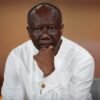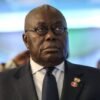Professor Ernest Aryeetey, former Vice Chancellor of the University of Ghana, has called on the incoming administration to expand the Science, Technology, Engineering, and Mathematics (STEM) educational project to meet the growing demands of people living in rural areas.
This comes amid concerns that the next National Democratic Congress (NDC) administration may cancel the Free Senior High School policy, a claim denied by the NDC Transition Team.
According to Prof Aryeetey, the incoming administration should focus on programs that promote specialization through hands-on learning in STEM fields.
He reiterated the importance of supporting higher education, citing the African Union’s Agenda 2063, which highlights the need to boost the number of students in STEM fields, encourage high-quality higher education institutions, and allocate 1% of GDP for research.
“The African Union, through the Agenda 2063, has highlighted the kind of support that needs to be given to higher education, boosting the number of students, especially in STEM, encouraging the growth of high-quality higher education institutions, and putting pressure on governments to put aside 1% of GDP for research.
And that’s something that is important,” Prof Aryeetey said.
He also stressed the need for universities to adapt and evolve, rather than being restricted by government mandates. “We should not stifle the dynamism of universities wanting to be different. We don’t need to force them all to look alike. We don’t need to force them to all do a narrowly defined set of programs. Let them through their own dynamism, let them through their own search for resources be able to navigate the waters and find where they are most comfortable,” he added.
Meanwhile, Prof Toyin Falola, Professor of African Studies at the University of Texas at Austin, believes that transforming universities in Africa to match the 21st-century global technological space is key to improving living standards.
“Nigeria controls one-third of the Bitcoin industry. Nigerian, Ghanaian youth, to those of us who do research among them, discover their capacity for coding, for programming, for certification, which they are now putting to good use,” Prof Falola said.
He also noted the importance of celebrating African intellectuals and their contributions to cultural preservation and historical preservation.
“These are products of African intellectuals that we do not celebrate enough. If you go to the Institute of African Studies, University of Ghana, go and visit their archives, the Nketiah Museum, you will see tremendous contributions to cultural preservation, historical preservation, that we don’t celebrate,” Prof Falola added.










